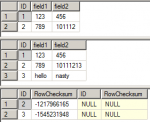speshulk92683
Member
- Joined
- Oct 25, 2013
- Messages
- 5
- Programming Experience
- 5-10
I have a requirement that I import a fairly large text file (~1 mil records with about 15 columns) every day. I am currently using a Data Table to set it up and then use a Truncate and then Bulk Copy, but I am trying to improve upon the process to make it run faster. I am running SQL 2008 and heard there was some sort of Merge ability, but I could not find any information on how to set that up. Does anyone know anything about this or how to set it up?
The data I receive every day is always all old records with a few more that were processed for that day and some of the old data in the file could have been updated or deleted as well.
Edit: If the merge isn't a valid thing for me to set up, I would love some suggestions on how to set up this import process to make it run faster and keep my indexes in place.
The data I receive every day is always all old records with a few more that were processed for that day and some of the old data in the file could have been updated or deleted as well.
Edit: If the merge isn't a valid thing for me to set up, I would love some suggestions on how to set up this import process to make it run faster and keep my indexes in place.
Last edited:

